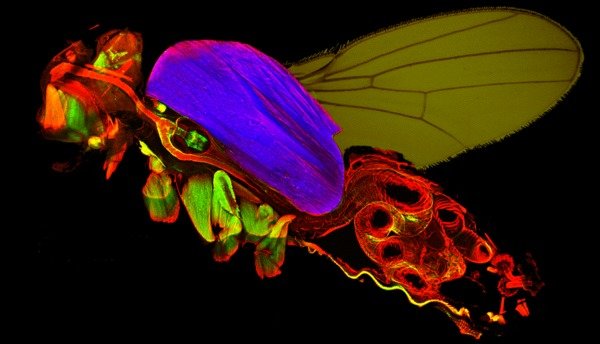
Research on flies at Max Planck Institutes
Some of the aspects that Max Planck scientists examine in fruit flies include ageing processes, dementia diseases and basic processes in the brain – astonishing for an organism that only lives for a month and whose brain "only" consists of 250,000 nerve cells. However, the fact is that ageing occurs much faster in the short-lived Drosophila, and it is easier to study a brain with a comparatively simple structure.
Anti-ageing for flies
Scientists from the Max Planck Institute for Biology of Ageing have developed a new foodstuff for flies in which they can individually change all the constituent parts. This enabled them to show that a low concentration of the amino acid methionine in the food prolongs the flies' life expectancy. The researchers are now using the insights gained from their fly research in order to develop new optimized diets for mice.
The researchers have also ascertained that the flies live longer if a certain signal pathway in their cells is less active. Insects with the relevant mutation not only live longer but are altogether healthier in old age: they sleep better and are better protected against many age-related diseases. Mice and humans also possess this so-called insulin/target of rapamycin signal pathway. It is little surprise, therefore, that persons with certain variations of the signal pathway also live longer on average.
The Max Planck scientists have also used the flies to demonstrate the life-prolonging effect of active agents that inhibit the signal pathway: flies which are fed trametinib, live up to twelve percent longer. The drug is already used in medicine to combat skin cancer. Substances which affect the insulin/target of rapamycin signal pathway, might therefore also prolong the life of humans.
The mood stabilizer lithium also appears to prolong the life of the flies: the insects live 16 percent longer if they are administered low doses of the drug used to treat depression. It was not previously known how lithium actually works. With the aid of the flies, the researchers have now discovered two molecules which drugs could target in order to slow down the ageing process: the so-called glycogen synthase kinase-3 (GSK-3) and NRF-2. The latter occurs in worms, flies and mammals, and it protects cells from damage. In the scientists' opinion, GSK-3 could be a target for drugs that affect the ageing process.
A combination of lithium, trametinib and the immune system regulator rapamycin has been used to extend the lifespan of fruit flies by even nearly 50 percent. Pills that combine low doses of multiple pharmaceutical products could therefore be effective as a medication to prevent age-related diseases.
Flies with dementia
Scientists from the Max Planck Institute for Biology of Ageing have equipped flies with a mutation also exhibited by people with frontotemporal dementia and Amyotrophic Lateral Sclerosis (ALS). They were able to show that certain proteins of the mutated C9orf72 gene killed nerve cells in the flies' brains. These toxic proteins are also found in the nerve cells of ALS patients and probably play an important role in humans.
Decisions in a fly's brain
Researchers at the Max Planck Institute of Neurobiology have discovered an area in the brain of flies which the flies use to make decisions. The so-called mushroom bodies are learning centres that evaluate sensory impressions and then take quick decisions. For example, they suppress the flies' innate dislike of carbon dioxide if it occurs together with the scent of food. In that case, the toxic gas indicates the presence of over-ripe fruit.
However, this does not result in the flies losing their dislike of carbon dioxide forever – an adjustment that is probably crucial for survival and which also helps us humans in evaluating sensory impressions. The smell of predatory animals, for example, triggers instinctive fear. We do not lose this fear even if we have previously seen many predators at the zoo without experiencing fear. Here, too, the brain appears to compare and come to different conclusions, depending on the circumstances.
Fat flies: like father like son
According to scientists from the Max Planck Institute of Immunobiology and Epigenetics, fruit flies pass on changes in their metabolism from father to son. A sugar-rich banquet before copulation may therefore have consequences for a fruit fly and its progeny: the fly's offspring will then be more prone to becoming overweight. The father's diet activates genes which can alter the epigenetic state of the genome. Such changes can be passed on, and in the next generation they control the activity of genes responsible for the lipid metabolism.
The researchers have also found a similar gene network in humans and mice which increases the susceptibility to becoming overweight. The researchers have evaluated the data from examinations of Pima Indians – a tribe of North American natives, members of which frequently suffer from obesity – as well as identical twins. According to this study, overweight individuals possess the same gene signature as the fruit flies. The susceptibility to high body weight increases therefore in people if the epigenetic state of certain genes is altered.